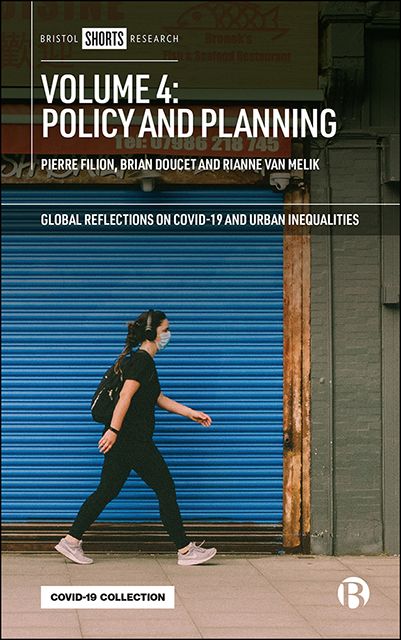Book contents
- Frontmatter
- Contents
- List of Figures and Tables
- Notes on Contributors
- Acknowledgments
- Preface to All Four Volumes of Global Reflections on COVID-19 and Urban Inequalities
- One Introduction: Policy Making in the Face of Uncertainty and Inequality
- Part I COVID-19 and Urban Changes
- Part II The Pandemic, Social Inequality, and Mobilization
- Part III Municipal and Urban Policy Responses
- Index
Eight - Navigating Socio-Economic Pressures in COVID-19 Urban Kenya: A Relational Geographies’ Perspective
Published online by Cambridge University Press: 25 April 2023
- Frontmatter
- Contents
- List of Figures and Tables
- Notes on Contributors
- Acknowledgments
- Preface to All Four Volumes of Global Reflections on COVID-19 and Urban Inequalities
- One Introduction: Policy Making in the Face of Uncertainty and Inequality
- Part I COVID-19 and Urban Changes
- Part II The Pandemic, Social Inequality, and Mobilization
- Part III Municipal and Urban Policy Responses
- Index
Summary
Introduction
Kenyan urbanites navigate their cities not only by moving through streets, buildings, means of transport, and other physical infrastructures. The densely intertwined social and economic landscapes of Kenyan society require them to dynamically move between different arrangements of social, economic, and material actors and actants in order to make ends meet. The need to quickly identify paths forward is exacerbated by the current predicament of living in times of the COVID-19 pandemic. By focusing on ruptures in the socio-economic relational space, we underline the importance of analyzing changing everyday practices against the backdrop of a massive external shock like the pandemic. Taking inspiration from Abdou Maliq Simone's description of African cities as ‘incessantly flexible, mobile, and provisional intersections’ that ‘have depended on the ability of residents to engage complex combinations of objects, spaces, persons, and practices’ (2004: 407– 8), our chapter presents first findings from research based on remote ethnography supported by five local research assistants (Agnes Sambiro Mwamburi, Judith M. Kawikya, Jack Omondi Misiga, John Abwajo, and Kenneth Muga) who conducted over 200 qualitative interviews in selected urban dwellings in Nairobi and Nakuru in July and August 2020.
Notwithstanding some expectable constraints of remote qualitative research, collaborating with team members on the ground while ensuring that measures of COVID-19 containment and personal safety are respected has enabled us to gain thorough insight into emerging economic pressures felt by different social groups in urban Kenya and how these are linked to broader social dynamics of increasing inequality. In Nairobi, the interviews took place in the informal settlement of Kibera, home to roughly half a million Kenyans; Pipeline, a low-income tenement settlement with one of sub-Saharan Africa's highest population densities; and Kileleswha, situated in Nairobi's more affluent western part and home of better off Nairobians and expats. In Nakuru, one of Kenya's central transportation and business hubs connecting Nairobi with the western part of Kenya and Uganda, our research assistants interviewed inhabitants of Ponda Mali, Rhonda, and Bondeni estates, all three of which are commonly described as slums. Our first section focuses on changing debt-relations and the emergence of what we call the COVID-19 economy, while the second discusses the effects of these economic changes on the social relations between the urban and the rural as well as between household members.
- Type
- Chapter
- Information
- Volume 4: Policy and Planning , pp. 81 - 90Publisher: Bristol University PressPrint publication year: 2021



